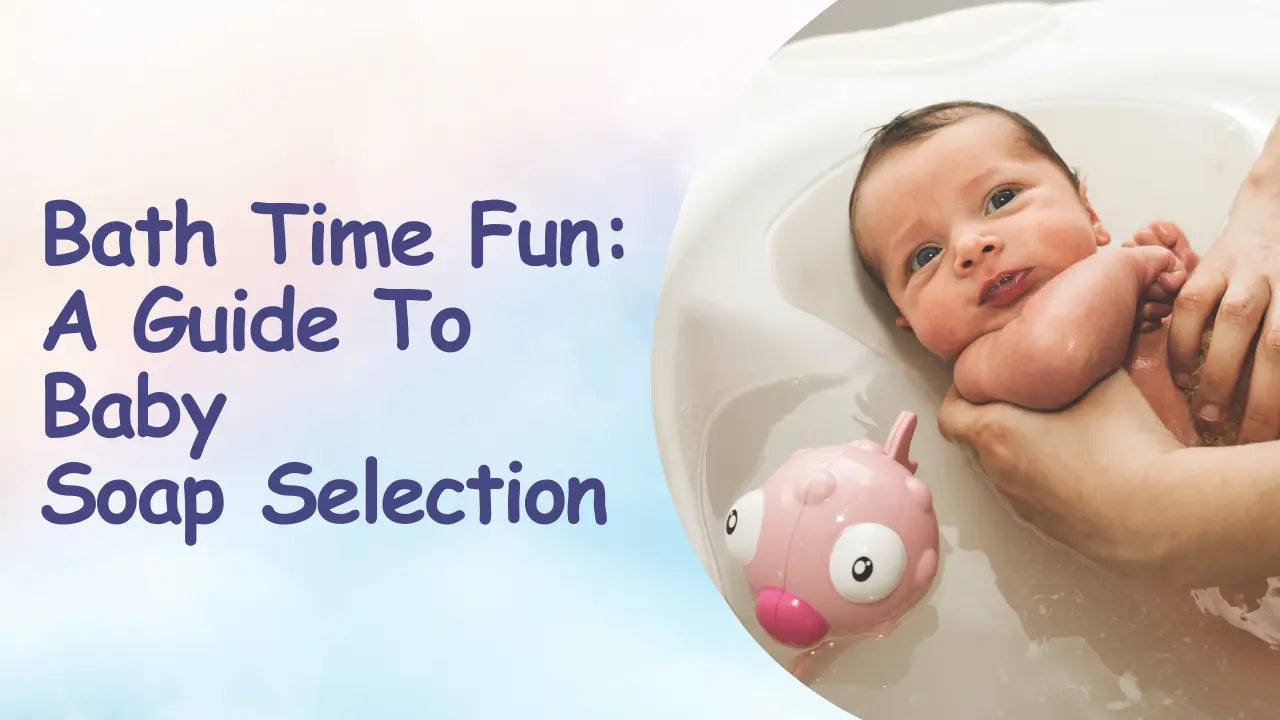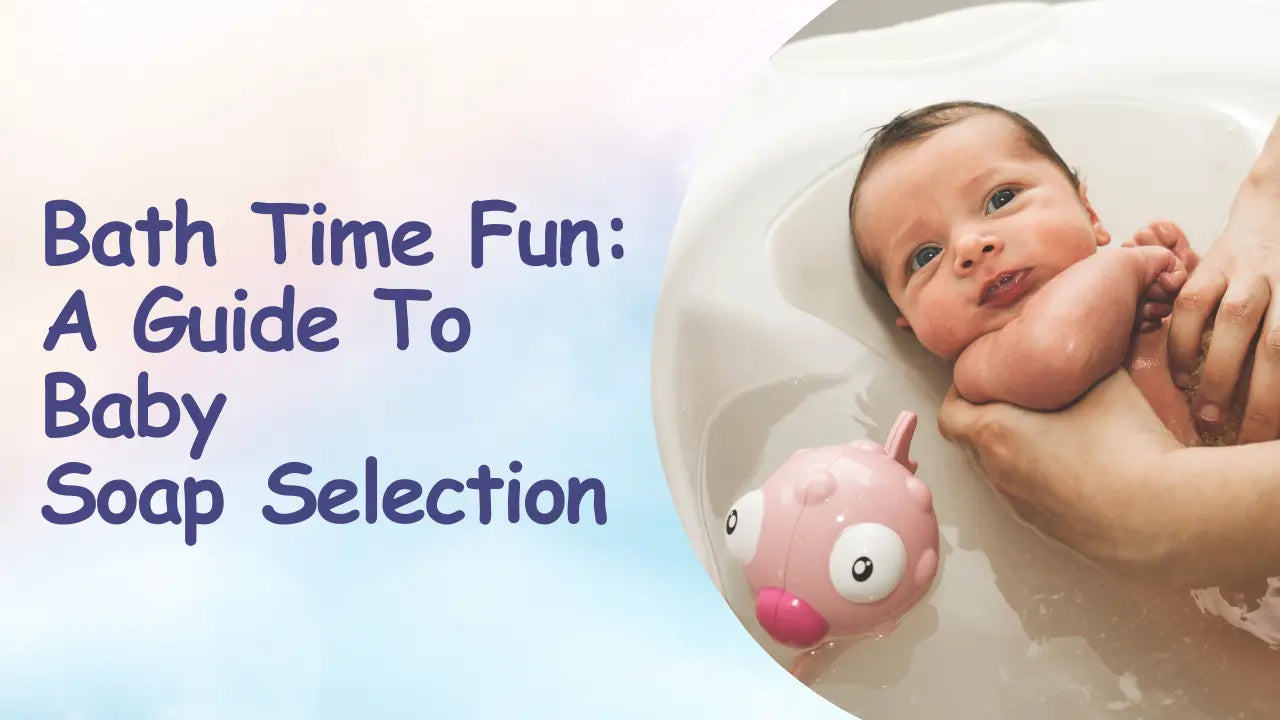Bath time is a cherished daily ritual, an intimate moment of connection between you and your precious newborn. As you fill the bath with warm water, your little one's eyes light up with anticipation, and their giggles fill the air as they splash around. It's a time when your baby experiences the soothing embrace of water, and you have the opportunity to bond in the most heartwarming way. To ensure that bath time is not only an enjoyable but also safe experience, the choice of best baby soap becomes of utmost importance. Baby care products, from soap to shampoo, must be gentle, free from harsh chemicals, and thoughtfully designed to safeguard your newborn's sensitive skin. In this comprehensive guide, we'll embark on a journey into the world of baby soap, focusing on the essential factors that deserve your attention when selecting the perfect soap for your little one's bath.
Understanding the Importance of Baby Care Products
Before delving into the specifics of baby soap selection, it's vital to understand why baby care products, including soap, are distinct from those meant for adults. A newborn's skin is significantly more delicate and sensitive than an adult's. It's also more prone to dryness and irritation. Therefore, the choice of baby soap plays a pivotal role in maintaining your baby's skin health.
Baby Soap Selection Factors
Hypoallergenic Formulas:
- Baby soap should be hypoallergenic, meaning it's formulated to be less likely to cause allergic reactions or skin irritations in sensitive newborn skin.
- Opt for soaps that are free from common allergens such as fragrances, dyes, parabens, and harsh chemicals.
- Look for labels that explicitly state "hypoallergenic" or "suitable for sensitive skin."
Gentle Ingredients:
- Baby soap should contain gentle and natural ingredients that are soothing and mild on a baby's delicate skin.
- Ingredients like aloe vera, chamomile, and calendula are well-known for their skin-soothing properties.
- Natural oils, such as coconut oil, can also be beneficial for moisturizing and nurturing your baby's skin.
Tear-Free Formula:
- Babies tend to be active and may wriggle during bath time, which can result in soap accidentally getting into their eyes.
- A tear-free formula is designed to minimize eye irritation and discomfort if soap does come into contact with the eyes.
- It's a crucial feature that ensures a more pleasant bath time experience for both parents and their newborns.
pH-Balanced:
- A baby's skin is naturally more acidic than an adult's skin. Maintaining the proper pH balance of your baby's skin is essential for their skin health.
- A pH-balanced soap helps preserve the skin's protective acid mantle, which acts as a barrier against harmful microorganisms and environmental factors.
- By using a pH-balanced soap, you can help protect and maintain your baby's skin health.
Dermatologist-Recommended:
- Baby soaps that come with recommendations from dermatologists are typically formulated with a deep understanding of the unique needs of a baby's sensitive skin.
- Dermatologist-recommended baby soaps are more likely to be free from common irritants and allergens, making them a safe choice for your baby's bath time routine.
- These products have undergone testing to ensure they are gentle and effective for newborn baby care.
Sulfate-Free:
- Baby soap should be free from sulfates, such as sodium lauryl sulfate (SLS) and sodium laureth sulfate (SLES).
- Sulfates are surfactants commonly found in many personal care products but can be harsh on the skin, potentially stripping it of its natural oils.
- Sulfate-free baby soap ensures that your baby's skin remains soft, moisturized, and free from dryness and irritation.
By considering these factors and opting for baby soap that meets these criteria, you can provide your baby with the care they need during bath time. Making the right choice in baby soap ensures that the experience is not only enjoyable and soothing but also safe and gentle for your precious newborn's sensitive skin. Prioritizing these factors when selecting baby soap is a responsible and loving way to care for your baby from their very first baths.
Read More: How Can You Choose a Safe and Effective Baby Lotion?
Best Practices for Using Baby Soap
To make the most of your baby soap, follow these best practices during bath time:
- Use Lukewarm Water: Always use lukewarm water for your baby's bath. Extreme temperatures can be uncomfortable and potentially harmful to their delicate skin.
- Limit Bath Time: Keep bath time short, usually around 5-10 minutes, to prevent excessive drying of the skin.
- Gentle Patting: After the bath, gently pat your baby's skin dry with a soft, absorbent towel. Avoid rubbing, as it can be harsh on the skin.
- Moisturize: Follow up with a gentle, fragrance-free baby lotion to keep your baby's skin soft and hydrated.
- Frequent Baths Are Not Necessary: Newborns don't get very dirty, so you don't need to bathe them daily. A few times a week is usually sufficient.
-
Pay Attention to Skin Reactions: If you notice any skin irritation, redness, or rashes, discontinue the use of the soap and consult with your pediatrician.
Read More: Top 5 Baby Skincare Products for Sensitive Skin
Conclusion: Making Bath Time a Delight
Selecting the right baby soap is a critical part of ensuring that bath time remains a joyful and safe experience for both you and your newborn. The ideal baby soap should be hypoallergenic, gentle, pH-balanced, and free from harsh chemicals. The right choice of baby care products can protect your baby's sensitive skin and maintain its health and softness.
Remember that each baby is unique, so it may take a bit of trial and error to find the baby soap that works best for your little one. Pay attention to your baby's cues and adjust your baby care routine accordingly. Ultimately, the goal is to make bath time a delightful bonding experience and a time of relaxation and enjoyment for your newborn. By selecting the right Baby Bathing Soap and following best practices, you can achieve just that and create wonderful memories during your baby's bath time.




